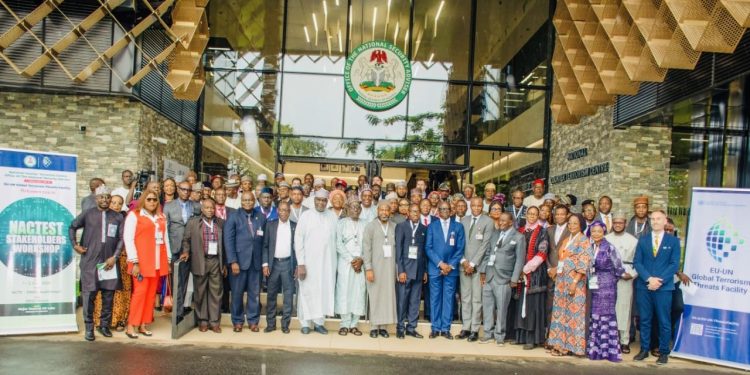By Nkechi Eze
In a decisive move to bolster national security and assume greater leadership in West Africa’s counter-terrorism efforts, the National Counter-Terrorism Centre (NCTC) has convened a high-level national workshop to review and finalise the revised National Counter-Terrorism Strategy (NACTEST). The strategy, which underpins Nigeria’s fight against terrorism and violent extremism, is being updated to align with new threats, global standards, and development goals.
The two-day workshop represents a pivotal moment in Nigeria’s counter-terrorism journey. It aims not only to strengthen domestic security coordination but also to position the country as a regional benchmark for strategy and cooperation.
Addressing participants at the opening session, the National Coordinator of the NCTC, Major General Adamu Laka, expressed gratitude to the wide range of stakeholders present, spanning government institutions, civil society, security services, and international partners. Delivering his remarks on behalf of the National Security Adviser, Mallam Nuhu Ribadu, mni, General Laka noted the significance of the review exercise.
“The 2016 strategy has served the nation well for nearly a decade, but the rapidly evolving security environment demands a comprehensive and forward-looking review,” he said. “This gathering reflects our collective resolve to ensure that our counter-terrorism framework remains effective, inclusive, and fit for purpose.”
He explained that the revised draft of NACTEST emerged from rigorous technical assessments and inclusive consultations with Ministries, Departments and Agencies (MDAs), civil society organisations, and global allies. He also announced that the review coincides with the NCTC’s transformation into a Regional Centre of Excellence for Counterterrorism in West Africa and the Sahel, an elevation confirmed by President Bola Ahmed Tinubu, GCFR.
“This transition places Nigeria at the forefront of regional efforts to combat terrorism and calls for a strategy that not only addresses national security concerns but also sets a standard for regional cooperation and leadership,” General Laka added.
Delivering the keynote address, the NCTC’s Director of Policy and Strategy, Commodore Ahmad Madawaki, described the revised strategy as a vital tool for unified national action. He said the document is guided by two strategic foundations: the Whole-of-Government and Whole-of-Society approaches.
“The Whole-of-Government approach ensures coherence and collaboration among institutions, while the Whole-of-Society model recognises the vital role of communities, civil society, traditional and religious leaders, academia, and the private sector in countering terrorism,” he said.
Commodore Madawaki emphasized that the updated strategy is firmly rooted in international legal standards, and is designed to uphold human rights, promote gender inclusion, and comply with humanitarian law. He revealed that the NCTC has formally urged MDAs to align their activities with the revised strategy and to ensure its integration into the upcoming National Development Plan (2026–2030) to promote long-term sustainability and secure funding.
He also announced that the Centre is currently hosting four advanced training programmes in partnership with the British Council. These include courses for Silver Commanders, Gold Commanders, Intelligence Analysts, and Aviation Security Trainers, reflecting the Centre’s growing regional role.















